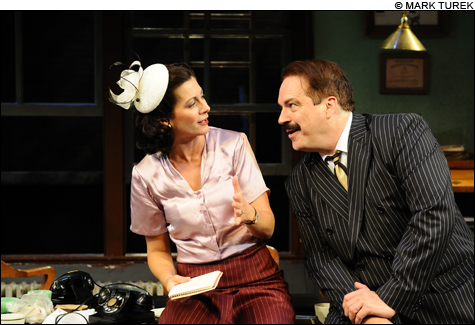
DESK JOB Brazil and Sullivan, Jr. |
There are theatrical adaptations and then there are magnificent transformations, like His Girl Friday. Multiple-Obie Award-winning playwright John Guare has expanded the furious screwball comedy into a historical/social commentary without our losing out on the knee-slapping.
The clever troupe at Trinity Repertory Company, directed by Curt Columbus, is improving on that base, adding countless little character flourishes for our further amusement. The upstairs theater production runs through October 9.
The 1940 comedy of the title was itself a successful film adaptation, when director Howard Hawks took the 1928 play The Front Page, by Ben Hecht and Charles MacArthur, and changed the gender of a smart aleck reporter so Rosalind Russell could exchange wisecracks with her editor boss, Cary Grant.
The single-room set by Eugene Lee is a realistic representation of the Chicago Criminal Courts press room, complete with a couple of bottles of whiskey brazenly on a filing cabinet. Cop killer Earl Holub (Phillippe Bowgen) will be hanged at dawn, as we are reminded now and then when the gallows outside the window noisily drops a practice sandbag.
Many hard-bitten reporters are playing poker and drifting in and out as they wait. The one we are interested in is Hildegard Johnson (Angela Brazil), who has popped in to say goodbye to the fellas before her marriage the next day. Hildy is settling down, moving to Albany with a staid insurance salesman, Bruce Baldwin (Stephen Thorne), and his starch-backed mother (Janice Duclos).
But Hildy is like a fire horse retired before its time, straining at the harness at the sound of an alarm bell. Her previous editor, and prior husband, Walter Burns (Fred Sullivan, Jr.) desperately wants her to stay and cover the story, not just because she's the zestiest writer of the pack but because he's still in love and wants to put the kibosh on her silly notion of marrying somebody else.
That's all fine and familiar. But Guare's version of the story becomes a revelation when he expands on the prejudices of the period, touched upon in the original play. He sets it on the eve of Germany's 1939 blitzkrieg against Poland, which precipitated World War II. This is Chicago, with large German and Polish immigrant populations, so when the reporters get excited about bloody crime details being phoned in and it becomes clear that the name being spelled is Polish, they mutter with one voice, "Ah — Polacks!" and lose interest.
That sort of remark continues. "That damn Jew makes it hard for everyone" somebody mutters about the prison warden. Passing comments are made about Charles Lindbergh not thinking that Hitler was such a bad guy and Henry Ford's opinion that "the Jews" were responsible for pushing us into war. In contrast is Burns's outraged social conscience: "They're hanging Holub so nobody notices how many people are going hungry!"
The condemned murderer is a Czech immigrant who, fearing for his life, shot a cop who was threatening him like a Nazi. The sheriff says of Holub, "Since we can't deport him, the best thing we can do is kill him."